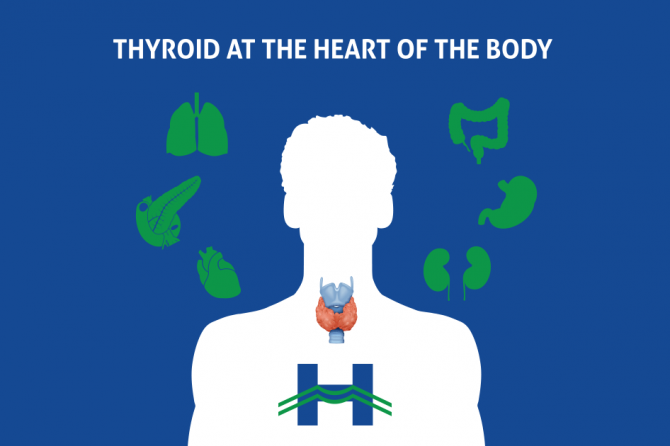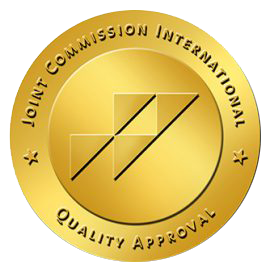
The thyroid gland is a silent butterfly-shaped organ located in the lower part of your neck, it plays a role in many of our important bodily functions. Fatigue, weight instability and sleep disturbances may all be related to troubles in the thyroid gland.
Dr. Georges Halaby, endocrinologist at Mount Lebanon Hospital, will explain everything you need to know about the thyroid gland.
What is the job description of the thyroid gland?
The thyroid gland is a vital part of the body, it is involved in several important functions, including:
- Metabolism and weight control
- Production of hormones
- Distribution of hormones to different organs and tissues of the body
- Regulating body temperature and energy use
- Maintaining the functions of various organs – mainly the heart, lungs, brain and muscles.
Can the thyroid gland be out of service?
The thyroid gland is prone to 3 disorders:
- The reduced secretion, or hypothyroidism, is due to laziness in the gland, causing the body to stop receiving an adequate amount of thyroid hormones to function properly. This condition has 3 causes: auto-immune disease, damage to the thyroid gland, or imbalanced iodine levels.
- The excessive secretion, or hyperthyroidism, is a condition which leads to an increase in metabolism.
- Enlargement in the gland is known as nodules, this is usually caused by decreased iodine levels. The nodules are produced in order to absorb a larger amount of iodine molecules. These are needed for the production of the thyroxine hormone. However, these nodules may be cancerous and may need to be surgically removed.
How to know if your thyroid gland is in trouble?
Problems in the thyroid gland can be expressed in several ways, they can sometimes be mistaken as poor daily habits. It is important to consult an endocrinologist if you experience any of the following signs:
Signs of hyperthyroidism:
- An increased heartbeat
- Sweating (even at rest)
- Unexplained weight loss despite a good appetite
- Increased sexual drive
- Forgetfulness
Signs of hypothyroidism:
- A decreased heartbeat
- Paleness
- Changes in the voice
- Unknown pain
- Unexplained weight gain (usually caused by water retention)
- Decreased sexual drive
- Depression
Other common signs of both hyperthyroidism and hypothyroidism:
- Laziness
- Fatigue
- insomnia
- Mood Disturbances
- Body temperature imbalances
- Changes in menstrual cycle
- Digestive problems
What tools are used to diagnose thyroid problems?
When any of the warning signs mentioned above are persistent, there are specific tests that can be done to detect the functionality of the thyroid gland.
These tests include:
- Blood tests: based on the levels of T4 and TSH, this eventually becomes compulsory for people over the age of 60. The levels of TSH indicate the activity of the gland. When TSH levels are close or below the lower limit, it indicates an elevated activity, whereas when they are close or above the upper limit, it indicates a decreased activity.
- Fluorescent iodine tests: conducted to detect the presence of nodules.
- Ultrasound: used to measure the size of the gland and to check for the existence of nodules.
Do thyroid problems affect the quality of our lives?
Suffering from problems in the thyroid gland can lead to various effects on the quality of our lives as well as affecting several different organs. Some of these effects include:
- The heart experiences a decrease or an increase in heartbeat levels
- Muscles and joints become stiff and painful
- The menstrual cycle becomes unstable
- Hearing levels may decrease especially in the case of hypothyroidism
- The digestive system can cause diarrhea in the case of hyperthyroidism, and constipation or Irritable Bowel Syndrome in the case of hypothyroidism
- Fertility can decrease due to hypothyroidism
- Brain damage in the fetus can occur during pregnancy due to hypothyroidism
Is there treatment that is custom made for my needs?
Treatments for thyroid gland problems are based on each individual case. Some examples of tailor-made treatments include:
- Surgery to remove part or all of the thyroid gland in one of the following 3 cases:
- Cancerous nodules
- Nodules pressing on the airways
- Hyperthyroidism among women within reproductive age – to avoid giving them fluorescent iodine as a form of treatment
- Replacement pills can be prescribed after surgery depending on how much of the gland is left, or in case of hypothyroidism.
Thyroid gland problems are very common; they are more common in women than in men. To maintain a healthy life, symptoms should not be left untreated. It is crucial to consult your physician every 6 months to maintain your health and to receive the necessary medical treatment that you may need!
Dr. Georges Halaby
Endocrinologist
Leave a reply 







